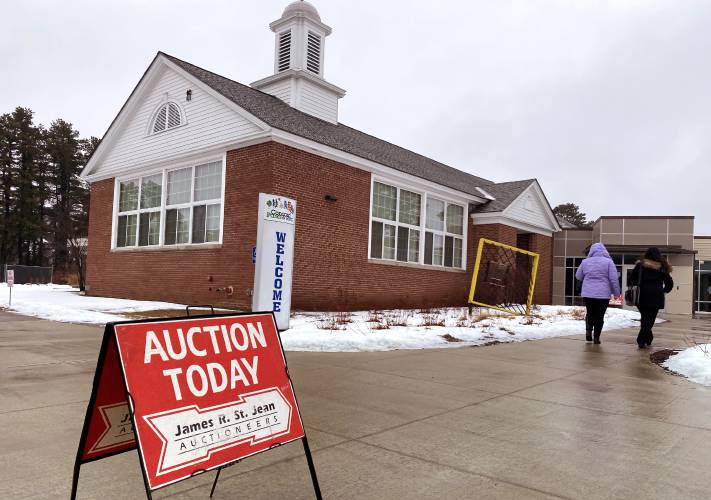In New Hampshire, when a homeowner falls behind on their property taxes, state law allows the local government to seize and sell their property. A new Monitor investigation, Seized and Sold, dives into how communities use this law and talks to the Granite Staters who were at risk of losing their homes.
From March 13, 2020, to June 11, 2021 – the duration of New Hampshire’s COVID-19 state of emergency – 75 towns and cities across the state seized 242 properties from Granite Staters. An executive order was in place at the time to prevent this exact thing from happening. Read more
New Hampshire politicians boast about low taxes and “economic freedom.” But when residents fall behind on property taxes, state law allows for their community to seize and sell their homes. It’s a process that often affects those who are low-income or elderly. Many said they hoped to die before the government took their home. Read more
Despite a uniform state law, towns and cities have great latitude over how they seize and sell homes. Some allow residents to continue to live in them despite unpaid taxes. A few rarely take ownership, if ever. While others schedule a public auction as soon as they can. Read more
See also: Inside a tax deed auction in Plymouth
Throughout the pandemic, federal relief money was used to pay overdue tax bills. Homeowners were able to buy back their properties and avoid losing their most valuable asset. It was the only lifeline of its kind and expired in March of 2024, leading to an expected uptick in municipal sales. Read more
New Hampshire politicians often make clear that discussing a sales or income tax is a non-starter. But neighboring states have pursued other options for relief that could help reduce the property tax burden on the Granite State’s elderly and working poor. Read more
See also: 'Where they stand' and 'A look into current use law'
Search our database of county registry of deeds records below:
Search our database of Merrimack County tax credits and exemptions below:
A video of preview of Seized and Sold from photo editor Geoff Forester.
Resources for residents behind on property taxes:
For local tax credits and exemptions:
By state law, New Hampshire municipalities are required to provide tax exemptions and credits for people who are elderly, blind, disabled and veterans. The amount provided is specific to each town, and set by a city council or voted on by residents at Town Meeting.
Applications are due to the municipality, typically the tax collector or assessing department by April 15. Some cities, like Concord, require their own elderly exemption application in addition to the state form.
For deferrals:
Residents who are either over the age of 65 or receive social security disability payments can also apply for a tax deferral. This allows people to defer all or a portion of their tax bill, with an annual interest rate of 5 percent. The tax deferal cannot exceed 85 percent of the assessed value of the property. If there is a mortgage on the property, the mortgage holder must approve.
Applications are due to the municipality, typically the assessing department, by March 1.
Hardship programs:
Some municipalities, like Concord, have a local financial hardship program for homeowners who are behind on their property taxes.
The Concord application can be filed any time with the assessing department.
State Low and Moderate Income Homeowners Property Tax Relief:
The state provides property tax relief for low to moderate income homeowners. This relief only applies to the state-wide education property tax portion of your tax bill.
Applications are due June 30 and can be filed online at www.revenue.nh.gov/gtc or by mailing this form to the Department of Revenue Administration at:
NH DRA
TAXPAYER SERVICES DIVISION
PO BOX 299
CONCORD, NH 03302-0299
If you are behind on your taxes and at risk of tax deed, you can also apply for legal assistance through 603legalaid.org or by calling (603) 224-3333.
New Hampshire Legal Assistance also has a Property Tax Relief Flyer
Inside the reporting: How the project came together
For a state that puts pressure on property tax collection, little oversight exists for what happens when residents fail to pay their bills. Tax deed documents are recorded at each of the state’s ten country registrars, but no collective record exists at the state level.
To build a database of all property seized by municipalities from 2013 to 2023, the Monitor accessed tax deed records from all ten counties. These records show when ownership of a property is transferred to the local government, but not if or when it is then sold. The Monitor could not determine precisely how many people were able to recover their homes – or how many have permanently lost them.
Towns and cities sometimes have their own tax cards and documents that track debt owed from initial liens to the total amount at auction, which the Monitor acquired through public records requests in Franklin, Berlin and Concord.
The Monitor called over 70 sources – from tax collectors, including the 21 communities that have not recorded a single deed in the last decade, county registrars, lawyers, auctioneers and elected officials – to better understand the tax deed process and its implications.
To find homeowners, Monitor reporter Michaela Towfighi and photo editor Geoff Forester knocked on the doors of dozens whose homes were recently deeded in the area, including properties in Concord, Franklin and Warner. None of the other homeowners who lost their property to the city of Franklin last year agreed to be interviewed aside from John Jones and Jessica Helfenstein.
Seized and Sold was produced in partnership with Report for America and the Investigative Editing Corps.







